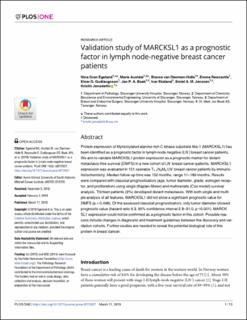| dc.contributor.author | Egeland, Nina Gran | |
| dc.contributor.author | Austdal, Marie | |
| dc.contributor.author | Van Diermen, Bianca | |
| dc.contributor.author | Rewcastle, Emma | |
| dc.contributor.author | Gudlaugsson, Einar | |
| dc.contributor.author | Baak, Jan P.A. | |
| dc.contributor.author | Skaland, Ivar | |
| dc.contributor.author | Janssen, Emiel | |
| dc.contributor.author | Jonsdottir, Kristin | |
| dc.date.accessioned | 2023-01-25T13:42:31Z | |
| dc.date.available | 2023-01-25T13:42:31Z | |
| dc.date.created | 2019-06-05T15:35:14Z | |
| dc.date.issued | 2019 | |
| dc.identifier.citation | Egeland, N. G., Austdal, M., van Diermen-Hidle, B., Rewcastle, E., Gudlaugsson, E. G., Baak, J. P., ... & Jonsdottir, K. (2019). Validation study of MARCKSL1 as a prognostic factor in lymph node-negative breast cancer patients. PloS one, 14(3), e0212527. | en_US |
| dc.identifier.issn | 1932-6203 | |
| dc.identifier.uri | https://hdl.handle.net/11250/3046357 | |
| dc.description.abstract | Protein expression of Myristoylated alanine-rich C kinase substrate like-1 (MARCKSL1) has been identified as a prognostic factor in lymph-node negative (LN-) breast cancer patients. We aim to validate MARCKSL1 protein expression as a prognostic marker for distant metastasis-free survival (DMFS) in a new cohort of LN- breast cancer patients. MARCKSL1 expression was evaluated in 151 operable T1,2N0M0 LN- breast cancer patients by immunohistochemistry. Median follow-up time was 152 months, range 11–189 months. Results were compared with classical prognosticators (age, tumor diameter, grade, estrogen receptor, and proliferation) using single (Kaplan-Meier) and multivariate (Cox model) survival analysis. Thirteen patients (9%) developed distant metastases. With both single and multiple analysis of all features, MARCKSL1 did not show a significant prognostic value for DMFS (p = 0.498). Of the assessed classical prognosticators, only tumor diameter showed prognostic value (hazard ratio 9.3, 95% confidence interval 2.8–31.0, p <0.001). MARCKSL1 expression could not be confirmed as a prognostic factor in this cohort. Possible reasons include changes in diagnostic and treatment guidelines between the discovery and validation cohorts. Further studies are needed to reveal the potential biological role of this protein in breast cancer. | en_US |
| dc.language.iso | eng | en_US |
| dc.publisher | PLOS | en_US |
| dc.rights | Navngivelse 4.0 Internasjonal | * |
| dc.rights.uri | http://creativecommons.org/licenses/by/4.0/deed.no | * |
| dc.title | Validation study of MARCKSL1 as a prognostic factor in lymph node-negative breast cancer patients | en_US |
| dc.type | Peer reviewed | en_US |
| dc.type | Journal article | en_US |
| dc.description.version | publishedVersion | en_US |
| dc.rights.holder | The authors | en_US |
| dc.subject.nsi | VDP::Medisinske Fag: 700 | en_US |
| dc.source.pagenumber | 1-12 | en_US |
| dc.source.volume | 14:e0212527 | en_US |
| dc.source.journal | PLOS ONE | en_US |
| dc.source.issue | 3 | en_US |
| dc.identifier.doi | 10.1371/journal.pone.0212527 | |
| dc.identifier.cristin | 1703016 | |
| cristin.ispublished | true | |
| cristin.fulltext | original | |
| cristin.qualitycode | 1 | |

